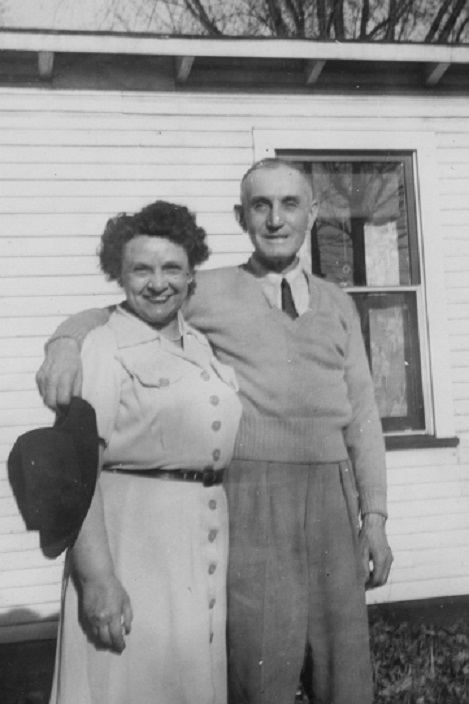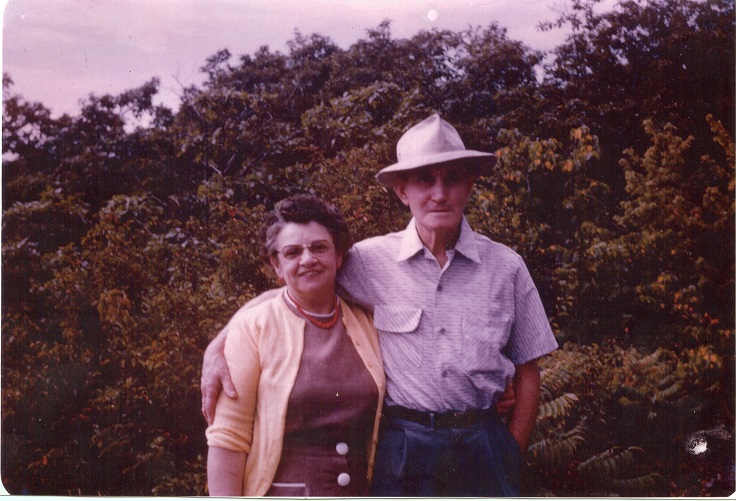Chapter Twenty
OSCAR
Dad, Vermonter, "Making a Go of It,"
Career Change, "Dad, I Didn't Know You"

It was not deliberately chosen but seemed natural to reconstruct the memories of my parents at two different times. Though they had married in love, and in love had begotten three healthy boys, they were in temperament and other ways two disparate individuals.
Mom was inclined to be emotional and vent her feelings. Dad would withdraw rather than concede. I recall arguments as a child in which they would yell at each other in emotional anguish, often emanating from the ever-pressing poverty that plagued our ailing farm and he -- while never admitting defeat -- would stomp out to the barns or fields. She would walk tearfully, but triumphantly, back to the kitchen to pick up work that would never be finished.
Dad had in his bones much of that old Vermont mystique that I could recognize but never fully describe. Like Ol' Mitch, a little withdrawn, a little impenetrable, and because we didn't know, we sometimes thought a little troubled. I don't suppose that is unique to Vermont, but it was where I became sensitive to it. He would not easily give vent to his feelings or expression of his affections, but that could have been by custom rather than lack of caring.
I know Dad loved baseball as did we and he would throw balls back and forth with us in the area between house and barn.
In those days even the smallest hamlet fielded its own baseball team and on Sunday afternoons in summer weather families would gather in converted cow pastures to watch local dads and boys compete with other towns. Dad was among them. I remember the field, just across the road from the cemetery, not far from our future high school field.
I can visualize him in the hayfield on a hot summer day, taking a break while talking to the hired man. He would be standing in his own peculiar stance, straw hat pushed back above his sweaty brow, a curl of hair falling toward his eyes, and in his unique at-rest position with right instep pressed against the top of the calf of the left leg. Mom would have sent one of us boys out with a pitcher of lemonade or ginger tea and I can see him take a long draught of the cool drink, wipe his mouth, look back at the clouds and the mountains, reposition his straw hat and say, "Well, boys, it just might rain. Best get back to work."
He was not one for much cussing but I recall one expression that I heard from no one else but him and then only on hot, humid, brow-mopping days when he'd mutter, "It's hotter than the hinges of hell."
One other farm memory of an often-repeated scene persists. Dad stands next to the woodpile chopping-block with axe in hand. We three boys, in anticipation of Sunday dinner, are chasing an elusive rooster around the yard. He is wary and squawking in protest, even taking to flight when we get close and eluding our grasp time after time. Finally all three of us wrestle him to the ground and bring him to Dad. After the beheading the rooster is not done; he races in circles around the yard spurting blood and, finally run dry, collapses there. Our job is unfinished for we will be assigned to pluck his feathers.
When Mom and Dad were first married, he worked at a cheese factory in Shoreham, Vermont, where they were content and happy. When Ol' Mitch became very ill, Dad agreed to return to the farm in New Haven to help out until Gramp got better. It became apparent that he would never again be able to run the farm alone, so Dad agreed to stay.
In other chapters of this short history, I have narrated many aspects of our farm experience in those days and some of Dad's problems in "making a go of it." Certainly the times were not propitious and the experiment with the chickens was ill-timed and disastrous, but his talents were misplaced. He had an intellectual and mathematical bent that if applied in other fields would have provided him a greater chance at material success. I recall times when he was optimistic and enjoyed the life. After all, it was a beautiful setting. Sometimes it seemed they had turned a corner for the better, but it was not to be. He left the farm, heavily in debt, at the age of forty.
How do you express or comprehend the feelings of a man, a father and husband and long-term farmer, separated from his family to find employment with the aid of in-laws as a kitchen helper in a local inn? We all matured a little and went our disparate ways.
At the Middlebury Inn he started as kitchen helper, peeling potatoes and preparing vegetables. He would not be long content with that, and hard work had never fazed him. He moved on to salad man and fry cook. He continued to acquire the skills of the kitchen, and when he moved on it was as assistant chef.
My mother was amazed. At home he had never fried an egg for himself; he couldn't have told what the various pans were for. Later he took a second chef job at a Connecticut resort hotel where I joined him one summer as a bellhop. Another summer -- while I was in college -- he was chef at Cooperstown Inn, Cooperstown, New York (Home of the Baseball Museum), and I joined him there as a waiter and bellhop.
Mom and Dad were reunited in Burlington and then joined Edward in Florida to help him with his restaurant. On their return to Vermont, they continued as a working pair -- Chef and Pastry Cook -- in various places as described in Mom's account.
I recall an instance when in the Army I visited them at the Schuyler Meadow Club in upstate New York. It was a prestigious place and had a large putting green with daunting slopes and angles easily accessible from the hotel kitchens. By that time I had become a fairly accomplished golfer. His only experience with golf was that putting green where, using an old putter of mine, he would spend idle time practicing. He proved deadly with that club and kept me buying the beer for my entire stay there.
Eventually they came back to Burlington and the Black Cat Cafe in their respective roles and they stayed until his final retirement. With the help of my G.I. loan, they bought the house on Hayward Street in Burlington and settled in. It was their first real home since they had left the farm. Mom started picking curtains and rugs with undisguised happiness.
I think of daughter Kathy's first words as she read the draft of this manuscript: "Dad, I didn't know you." At what age and time do you get to know your parents?
My first inkling of Dad's feelings for me was when I was drafted for World War II (Edward and Richard had already enlisted) and we went as a family down to the railroad station for boarding with the other recruits enroute to Fort Devens Induction Center in Massachusetts. We said our goodbye and Dad stood by and then impulsively hugged me and brushed my cheek with his lips. I had this sudden comprehension, "He loves me. Dad loves me," and I saw tears in his eyes. I hugged him back and stammered, "I'll miss you, Dad." It was an epiphany for us both.
True Vermont men would never be so outspoken again or display such emotion, but the bond that had been finally made would remain through our times.
As Dad's cancer spread, Mom cared for him in the same loving way she had provided the babies intrusted in her care.
He died in Burlington in 1965 and was buried in Resurrection Park, the Catholic Cemetery, in South Burlington.
